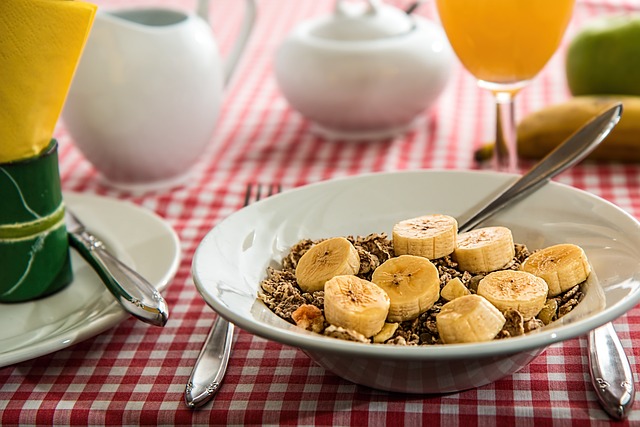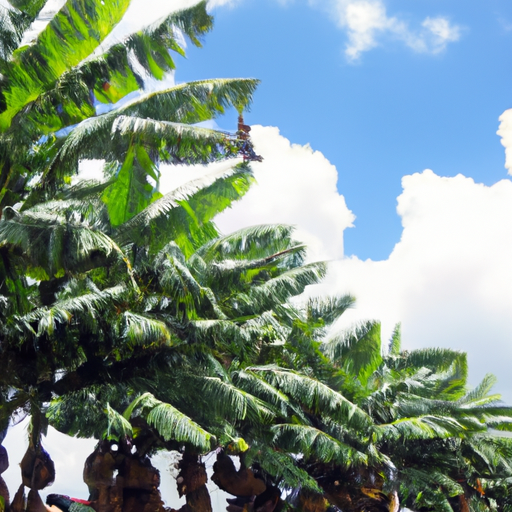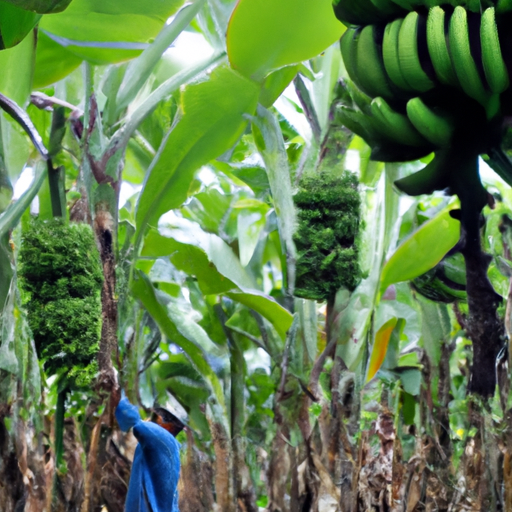Have you ever wondered about the economic impact of the banana industry in Suriname? Well, let’s dive in and explore this fascinating topic further. In this article, we will discuss the important role that bananas play in Suriname’s economy and how they contribute to the country’s overall development. So get ready to learn more about the banana industry in Suriname!
Suriname, a small country located in South America, relies heavily on the banana industry for economic growth. Bananas are one of Suriname’s major agricultural exports, bringing in substantial revenue and providing employment opportunities for many locals. The country boasts rich fertile soil and a favorable climate, which contributes to its ability to cultivate high-quality bananas. As a result, Suriname has become a significant player in the global banana market. In this article, we will delve into the various aspects of Suriname’s banana industry, including its historical background, production methods, and market trends. So if you’re curious to learn more about the economic impact of bananas in Suriname, keep reading!

History of the Banana Industry in Suriname
Origins of banana cultivation in Suriname
Suriname’s banana industry has a rich history that dates back to the 19th century. The first banana plants were brought to Suriname by Dutch planters who settled in the country during its colonial period. These planters introduced banana cultivation as a means of diversifying the agricultural sector and capitalizing on Suriname’s fertile soil and favorable climate.
Development and growth of the industry
Over the years, banana cultivation in Suriname expanded steadily, with small-scale farmers playing a crucial role in the industry’s development. The industry experienced significant growth during the early 20th century, with exports of bananas reaching their peak in the 1950s and 1960s. During this time, Suriname was one of the leading banana producers in the region, and bananas became an important cash crop for the country.
Impact of historical events on the industry
Like many other industries, the banana industry in Suriname has faced several challenges throughout its history. The industry was significantly impacted by historical events such as World War II and the subsequent decline of European colonial powers. These events disrupted international trade and led to a decline in banana exports from Suriname. Additionally, political instability and economic crises in the country have also affected the industry’s growth and development.
Current State of the Banana Industry in Suriname
Major banana producing regions in Suriname
Banana cultivation is widespread throughout Suriname, with major producing regions including Nickerie, Coronie, and Wanica. These regions have favorable climatic conditions and suitable soil for banana production, making them ideal for cultivating high-quality bananas.
Production and export statistics
The banana industry in Suriname continues to play an important role in the country’s economy. According to recent statistics, Suriname produced approximately 200,000 tons of bananas in the past year. The majority of these bananas were exported to countries such as the Netherlands, Belgium, and the United States. The industry contributes significantly to Suriname’s foreign exchange earnings and provides employment opportunities for thousands of people.
Key players in the industry
The banana industry in Suriname is primarily driven by small-scale farmers who cultivate bananas on their own land. These farmers are supported by various cooperatives and associations, which help them access markets and provide training and technical assistance. Additionally, larger companies also play a role in the industry, providing infrastructure and logistical support for banana production and export.

Economic Importance of the Banana Industry in Suriname
Contribution to GDP and employment
The banana industry in Suriname is a vital contributor to the country’s gross domestic product (GDP). It provides employment opportunities for thousands of people, both directly and indirectly. From farmers and plantation workers to transportation and logistics personnel, the industry creates a significant number of jobs that help alleviate poverty and improve the standard of living in rural communities.
Foreign exchange earnings
The export of bananas generates substantial foreign exchange earnings for Suriname. Through trade agreements and market demand, Suriname has secured stable export markets for its bananas. These earnings contribute to the country’s overall foreign reserves and help sustain its import-dependent economy.
Linkages with other sectors of the economy
The banana industry in Suriname has strong linkages with other sectors of the economy. The industry relies heavily on transportation and logistics services for exporting its produce. Additionally, it creates indirect economic opportunities for agrochemical suppliers, packaging manufacturers, and other related industries. This interdependence helps diversify Suriname’s economy and strengthens its agricultural sector.
Challenges and Constraints Faced by the Banana Industry in Suriname
Pests and diseases affecting banana plantations
Bananas are susceptible to various pests and diseases, which can significantly impact plantation yields. One of the major challenges faced by the banana industry in Suriname is the control and management of pests such as nematodes, thrips, and mites. Additionally, diseases like Panama disease and black Sigatoka pose threats to banana plantations and require proactive measures to prevent their spread.
Environmental and climate-related risks
Suriname, like many other countries, is vulnerable to the effects of climate change. As temperatures rise and weather patterns become more erratic, the banana industry faces the risk of extreme weather events such as hurricanes and flooding. These events can cause substantial damage to plantations and disrupt the overall production and export processes.
Market competition and price fluctuations
The global banana market is highly competitive, with several countries vying for market share. Suriname faces stiff competition from other banana-producing countries in the region, as well as from large multinational corporations. Additionally, price fluctuations in the international market can impact the profitability of Suriname’s banana industry, making it challenging for farmers to plan and invest.

Government Policies and Initiatives to Support the Banana Industry
Subsidies and incentives for banana farmers
The Surinamese government recognizes the importance of the banana industry and has implemented various policies and initiatives to support its growth. These include providing subsidies and incentives for banana farmers, such as access to low-interest loans, grants for infrastructure development, and tax breaks. These measures aim to improve the competitiveness of Suriname’s bananas in the global market and encourage farmers to invest in their production.
Infrastructure development for transportation and logistics
The government has also prioritized infrastructure development to facilitate the transportation and logistics of bananas. This includes improving road networks, upgrading ports and airports, and investing in storage and packaging facilities. By enhancing transportation and logistics capabilities, the government aims to reduce post-harvest losses and ensure the timely delivery of Suriname’s bananas to export markets.
Research and development initiatives
To address the challenges faced by the banana industry, the government has initiated research and development programs. These programs focus on improving banana varieties, enhancing disease resistance, and promoting sustainable farming practices. By investing in research and development, the government aims to enhance the productivity and resilience of Suriname’s banana industry.
Technology and Innovation in the Banana Industry
Adoption of modern farming techniques
The banana industry in Suriname has embraced modern farming techniques to improve productivity and efficiency. Farmers are increasingly utilizing advanced irrigation systems, precision farming technologies, and greenhouse cultivation methods. These techniques help optimize water and fertilizer usage, reduce the environmental impact of banana cultivation, and increase yields.
Use of agrochemicals and biotechnology
Agrochemicals play a crucial role in protecting banana crops from pests and diseases. Farmers in Suriname utilize a range of pesticides and fungicides to manage and control these threats. Additionally, advancements in biotechnology have opened up new possibilities for genetic improvement and disease resistance in bananas. Suriname’s banana industry has been exploring the potential of biotechnology to develop more resilient banana varieties.
Efforts towards sustainability and organic farming
There is growing recognition of the need for sustainable and environmentally friendly practices in the banana industry. Suriname’s banana farmers are increasingly adopting organic farming methods, minimizing the use of pesticides and synthetic fertilizers. These efforts not only reduce the environmental impact of banana cultivation but also contribute to the production of high-quality, organic bananas that cater to the demands of niche markets.

Social Impact of the Banana Industry in Suriname
Employment opportunities for rural communities
The banana industry in Suriname provides significant employment opportunities for rural communities. Many small-scale farmers and plantation workers rely on the industry for their livelihoods. The industry’s labor-intensive nature ensures that employment is generated at various levels, helping reduce rural poverty and improve the overall socio-economic conditions of these communities.
Income distribution and poverty alleviation
The income generated from the banana industry contributes to a more equitable distribution of wealth in Suriname. The industry’s value chain provides income opportunities not only for farmers but also for transportation workers, packaging workers, and other individuals involved in the production and export processes. This income distribution helps alleviate poverty and reduce income disparities in the country.
Social responsibility and community development initiatives
The banana industry in Suriname has also taken proactive steps towards social responsibility and community development. Many industry players support social initiatives such as education and healthcare programs for workers and their families. Additionally, some companies invest in infrastructure development in rural areas, improving living conditions and access to basic amenities.
Environmental Sustainability in the Banana Industry
Efficient natural resource management
Suriname’s banana industry recognizes the importance of efficient natural resource management for long-term sustainability. Farmers are encouraged to implement water conservation practices, such as utilizing drip irrigation systems and rainwater harvesting techniques. Additionally, soil erosion control measures, such as terracing and cover cropping, are employed to protect the land and maintain soil fertility.
Waste reduction and recycling practices
Efforts are being made within the banana industry to reduce waste and promote recycling. Banana peels and other organic waste are utilized for composting, which helps enrich the soil and reduce the need for synthetic fertilizers. Packaging materials are also being designed to be more sustainable, with a focus on reducing plastic waste and utilizing biodegradable alternatives.
Protection of biodiversity and ecosystems
The banana industry in Suriname acknowledges the importance of biodiversity conservation and the preservation of ecosystems. Farmers are encouraged to implement agroforestry practices, which involve planting trees and other vegetation alongside banana plantations. These practices not only enhance biodiversity but also provide habitat for beneficial insects and promote natural pest control.

International Trade and Market Trends
Global demand for bananas
Bananas are one of the most popular fruits worldwide, with a high demand in both developed and developing countries. Suriname’s banana industry benefits from this global demand, as the country’s bananas are known for their quality and taste. As consumer preferences increasingly shift towards healthy and natural food choices, the demand for bananas is expected to continue growing.
Export markets and trade agreements
Suriname’s bananas are primarily exported to European markets, with the Netherlands, Belgium, and other European Union countries being the major importers. The industry also exports to the United States and other countries in the region. Suriname benefits from preferential trade agreements, such as the Economic Partnership Agreement with the European Union, which provides duty-free access to the European market for its bananas.
Impact of international price fluctuations
The banana industry in Suriname is vulnerable to international price fluctuations, which can impact the profitability of banana exports. Changes in market conditions, such as increases in production from other countries or shifts in consumer preferences, can lead to price volatility. Suriname’s industry must adapt and respond to these fluctuations to remain competitive in the global market.
The Future of the Banana Industry in Suriname
Opportunities for expansion and diversification
Despite the challenges it faces, the banana industry in Suriname has several opportunities for expansion and diversification. Suriname’s diverse climate allows for the cultivation of different banana varieties, including organic and specialty bananas. Additionally, there is potential for value addition through the processing of bananas into products such as purees, chips, and juices, which can open up new markets and increase profitability.
Investment prospects and challenges
Investment in the banana industry in Suriname offers promising prospects for both local and foreign investors. The government’s support through subsidies and incentives, coupled with favorable market conditions and increasing global demand, creates an attractive investment environment. However, challenges such as limited access to finance and infrastructure constraints need to be addressed to fully capitalize on these investment opportunities.
Emerging trends and technologies
The banana industry is evolving, and several emerging trends and technologies are expected to shape its future. These include the adoption of precision agriculture techniques, such as remote sensing and drone technology, to optimize production and reduce environmental impact. Additionally, there is growing interest in sustainable packaging solutions and traceability systems to meet consumer demands for transparency and eco-friendliness.
Role of Research and Development in Advancing the Banana Industry
Genetic improvement and disease resistance
Research and development play a crucial role in advancing the banana industry in Suriname. Efforts are being made to improve banana varieties through genetic improvement programs, focusing on traits such as disease resistance, yield potential, and post-harvest quality. These advancements help enhance the productivity and resilience of Suriname’s banana plants, ensuring a sustainable and profitable industry.
Post-harvest technologies and value addition
Developing post-harvest technologies and value addition processes is another area of focus for research and development in the banana industry. Advanced storage and packaging techniques are being explored to extend the shelf life of bananas and reduce post-harvest losses. Additionally, research is being conducted on value addition processes, such as producing banana-based snacks and beverages, to diversify product offerings and create additional revenue streams.
Market research and consumer preferences
Understanding consumer preferences and market trends through market research is essential for the success of the banana industry. Research helps identify new market opportunities, assess consumer demands, and develop strategies to meet these demands. By staying abreast of market trends and consumer preferences, Suriname’s banana industry can ensure it remains competitive and responsive to changing market conditions.
Collaboration and Partnerships in the Industry
Public-private partnerships for sustainable development
The banana industry in Suriname benefits from strong public-private partnerships that aim to promote sustainable development. These partnerships involve collaboration between government agencies, industry associations, research institutions, and private companies. By working together, these stakeholders address common challenges, implement best practices, and drive innovation in the industry.
International collaborations and knowledge exchange
Suriname’s banana industry actively engages in international collaborations and knowledge exchange to enhance its competitiveness. Through partnerships with international organizations, research institutions, and industry experts, Suriname’s banana industry gains access to global expertise, technology, and market insights. These collaborations promote learning, innovation, and the adoption of best practices in the industry.
Role of industry associations and trade unions
Industry associations and trade unions play a vital role in representing the interests of banana farmers and workers in Suriname. These organizations advocate for fair trade practices, provide training and support to their members, and facilitate market access. The collective efforts of industry associations and trade unions contribute to the overall development and sustainability of Suriname’s banana industry.
Risk Assessment and Mitigation Strategies
Risk analysis and contingency planning
The banana industry in Suriname recognizes the importance of risk assessment and contingency planning to mitigate potential disruptions. Proactive risk analysis helps identify potential threats, such as pests, diseases, and extreme weather events, and develop strategies to manage and minimize their impact. Contingency plans ensure that the industry can respond effectively to unforeseen circumstances and maintain its operations.
Insurance and financial support mechanisms
Insurance and financial support mechanisms are crucial for the resilience of the banana industry. Farmers and industry stakeholders can avail themselves of insurance policies that protect against crop loss and damage due to pests, diseases, or natural disasters. Additionally, financial support mechanisms, such as access to affordable credit and grants, help farmers and companies invest in the necessary infrastructure and technology to withstand risks.
Diversification and resilience strategies
To mitigate risks associated with market volatility and evolving consumer preferences, diversification and resilience strategies are essential. The banana industry can explore diversification by cultivating different banana varieties, targeting niche markets, and developing value-added products. Building resilience involves investing in sustainable farming practices, adopting innovative technologies, and fostering collaboration within the industry to adapt and thrive in a changing environment.
Conclusion
The banana industry in Suriname has a long and vibrant history, playing a pivotal role in the country’s economy. Despite facing challenges and constraints, the industry is resilient and continues to contribute significantly to Suriname’s GDP, employment, and foreign exchange earnings. The government’s supportive policies, investments in infrastructure, and research and development initiatives have helped strengthen the industry’s competitiveness and sustainability.
Looking to the future, the banana industry in Suriname holds promising prospects for expansion and diversification. Emerging technologies, changing consumer preferences, and international market trends provide opportunities to enhance productivity, reduce environmental impact, and create value-added products. Collaboration and partnerships will be crucial for the industry to navigate risks and capitalize on these opportunities.
Through a combination of research and development, sustainable practices, and strong industry alliances, the banana industry in Suriname can continue to thrive and contribute to the country’s economic growth and social well-being. As Suriname’s banana exports reach new markets and consumers, the industry will remain an important driver of economic development and a symbol of Suriname’s agricultural prowess.